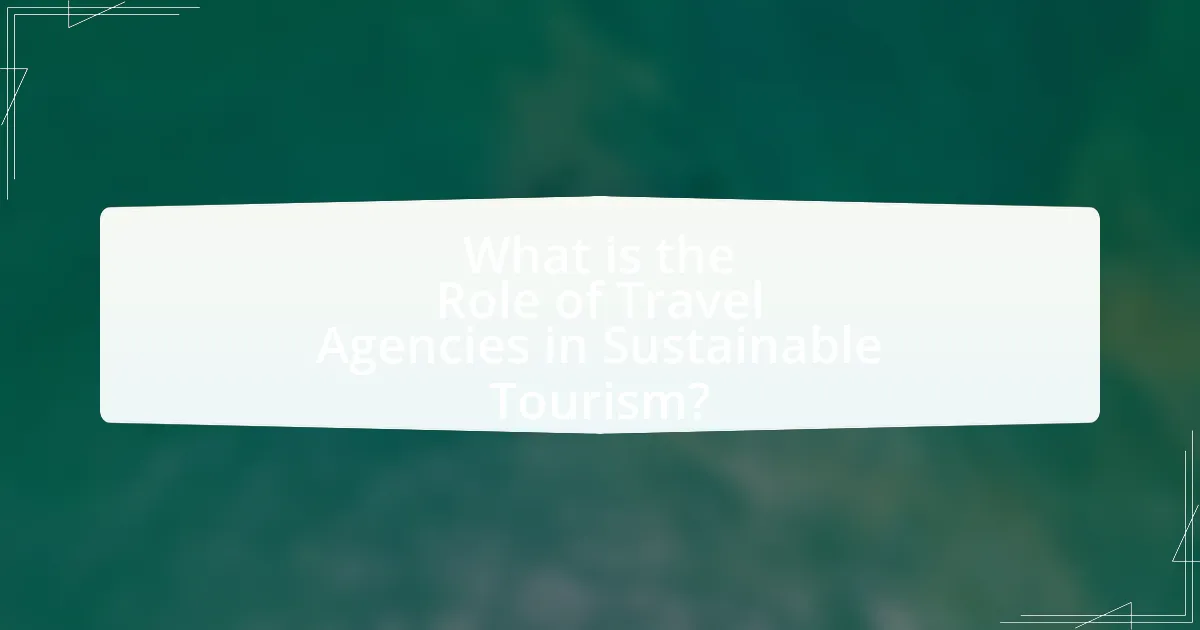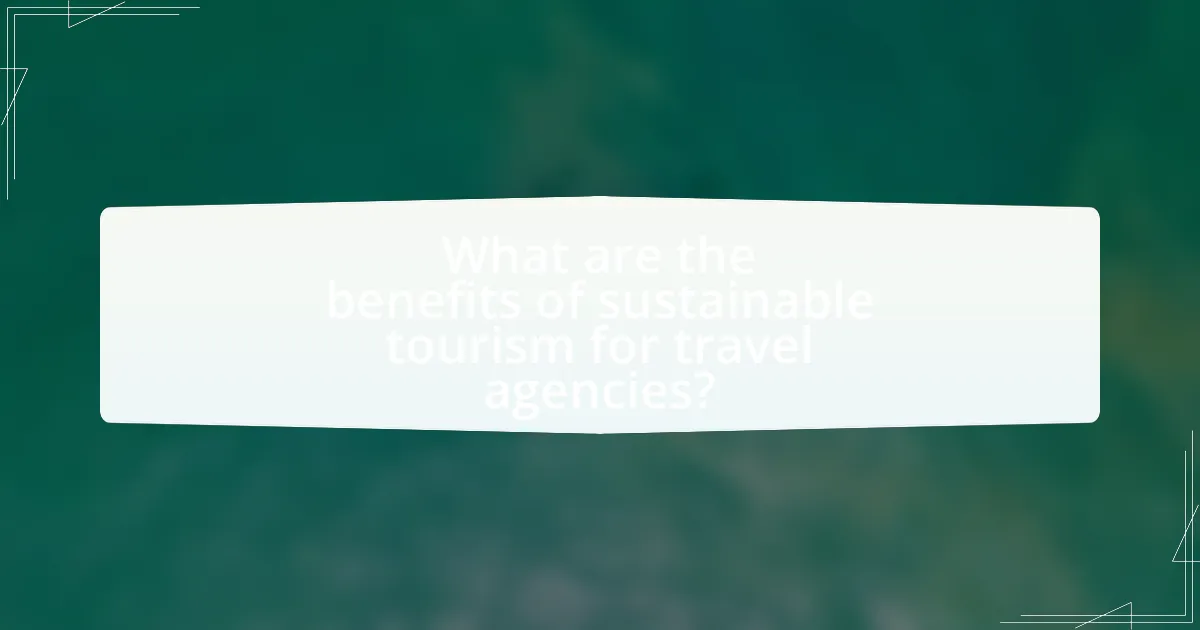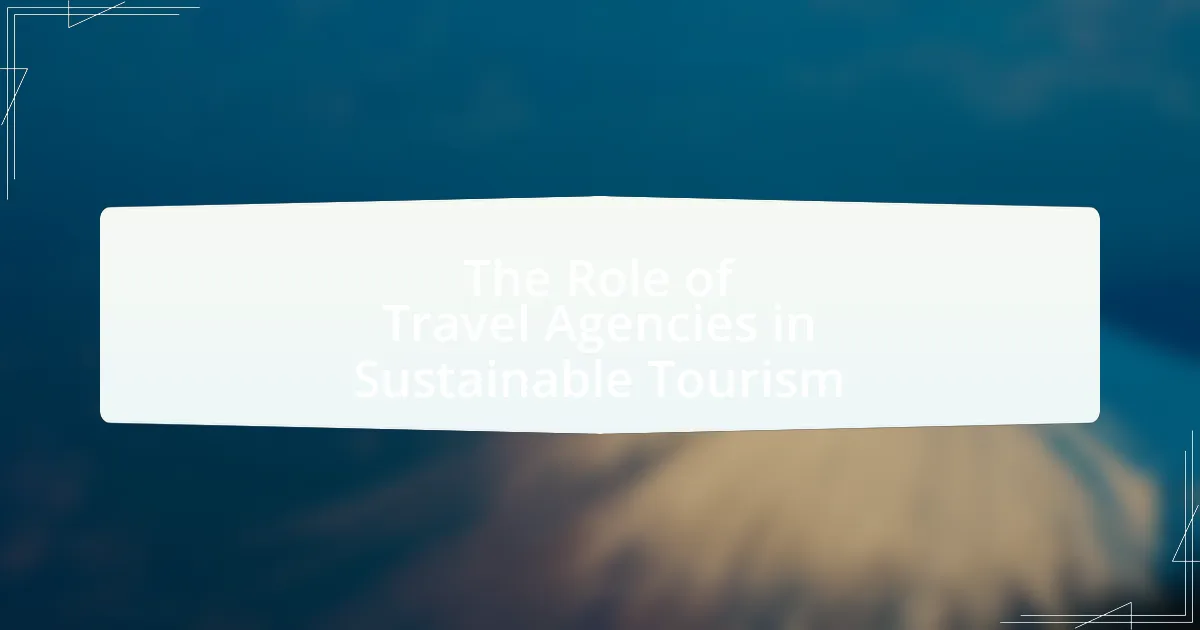Travel agencies play a vital role in promoting sustainable tourism by offering eco-friendly travel options and educating travelers on responsible practices. They curate travel packages that emphasize local cultures, environmental conservation, and community engagement, thereby mitigating the negative impacts of tourism. The article explores how travel agencies contribute to sustainable practices through partnerships with local businesses, the promotion of eco-friendly accommodations, and the implementation of educational initiatives. It also addresses the challenges agencies face in promoting sustainability, the influence of consumer demand, and the long-term benefits of adopting sustainable practices for both the environment and the travel industry.

What is the Role of Travel Agencies in Sustainable Tourism?
Travel agencies play a crucial role in promoting sustainable tourism by facilitating eco-friendly travel options and educating travelers about responsible practices. They curate travel packages that prioritize local cultures, environmental conservation, and community engagement, thereby reducing the negative impacts of tourism. For instance, according to the United Nations World Tourism Organization, sustainable tourism can contribute to the conservation of biodiversity and cultural heritage, which travel agencies can support by partnering with local businesses and promoting off-the-beaten-path destinations. By advocating for sustainable practices, travel agencies help travelers make informed choices that align with environmental and social responsibility.
How do travel agencies contribute to sustainable tourism practices?
Travel agencies contribute to sustainable tourism practices by promoting eco-friendly travel options and supporting local communities. They often curate travel packages that emphasize responsible tourism, such as eco-lodges and tours that minimize environmental impact. For instance, a study by the United Nations Environment Programme highlights that travel agencies can influence consumer choices by providing information on sustainable practices, leading to increased demand for environmentally conscious travel. Additionally, many agencies partner with local businesses, ensuring that a larger portion of tourism revenue stays within the community, which fosters economic sustainability.
What specific strategies do travel agencies implement for sustainability?
Travel agencies implement several specific strategies for sustainability, including promoting eco-friendly travel options, partnering with local communities, and reducing carbon footprints. By offering packages that prioritize sustainable accommodations, such as eco-lodges, and encouraging clients to choose low-impact transportation methods, travel agencies help minimize environmental impact. Additionally, many agencies collaborate with local businesses to ensure that tourism benefits the community economically and culturally, fostering responsible tourism practices. According to a report by the United Nations World Tourism Organization, sustainable tourism can contribute to economic growth while preserving natural and cultural resources, highlighting the importance of these strategies in the travel industry.
How do travel agencies educate travelers about sustainable options?
Travel agencies educate travelers about sustainable options by providing information on eco-friendly practices, promoting responsible tourism, and offering sustainable travel packages. They often conduct workshops, distribute educational materials, and utilize digital platforms to raise awareness about the environmental impact of travel choices. For instance, a study by the Global Sustainable Tourism Council indicates that agencies that incorporate sustainability training into their services can significantly influence traveler behavior towards more eco-conscious decisions.
Why is sustainable tourism important for travel agencies?
Sustainable tourism is important for travel agencies because it enhances their competitiveness and aligns with consumer demand for responsible travel options. As travelers increasingly prioritize environmental and social responsibility, agencies that promote sustainable practices can attract a growing market segment. According to a 2021 report by Booking.com, 81% of global travelers expressed a desire to travel sustainably, indicating a clear shift in consumer preferences. By adopting sustainable tourism practices, travel agencies not only contribute to environmental conservation but also improve their brand reputation and customer loyalty, ultimately driving business growth.
What are the environmental impacts of tourism that agencies address?
The environmental impacts of tourism that agencies address include habitat destruction, pollution, and resource depletion. Agencies recognize that tourism can lead to the degradation of natural landscapes and ecosystems, as seen in areas where infrastructure development disrupts wildlife habitats. Additionally, tourism contributes to air and water pollution through increased transportation emissions and waste generation, which agencies aim to mitigate by promoting eco-friendly practices. Resource depletion occurs as tourism places high demands on local water and energy supplies, prompting agencies to advocate for sustainable resource management strategies. These impacts are critical for agencies to address in order to promote sustainable tourism practices that protect the environment.
How does sustainable tourism enhance the reputation of travel agencies?
Sustainable tourism enhances the reputation of travel agencies by aligning their services with environmentally and socially responsible practices. This alignment attracts a growing demographic of eco-conscious travelers who prioritize sustainability in their travel choices. According to a 2021 study by Booking.com, 81% of global travelers feel strongly that people need to act now to save the planet, indicating a significant market demand for sustainable options. By promoting eco-friendly accommodations, responsible wildlife experiences, and community-based tourism, travel agencies can differentiate themselves in a competitive market, thereby improving their brand image and customer loyalty.
What challenges do travel agencies face in promoting sustainable tourism?
Travel agencies face significant challenges in promoting sustainable tourism, primarily due to a lack of consumer awareness and demand for sustainable options. Many travelers prioritize cost and convenience over sustainability, making it difficult for agencies to market eco-friendly choices effectively. Additionally, travel agencies often encounter limited access to reliable information about sustainable practices and destinations, which hampers their ability to provide accurate recommendations. According to a study by the United Nations World Tourism Organization, only 30% of travelers actively seek sustainable travel options, highlighting the gap in consumer interest. Furthermore, travel agencies may struggle with partnerships and collaborations with sustainable service providers, as these options can be less established or more expensive than traditional offerings.
How do economic factors influence travel agencies’ sustainability efforts?
Economic factors significantly influence travel agencies’ sustainability efforts by determining their financial capacity to invest in eco-friendly practices. For instance, agencies with higher profit margins can allocate more resources towards sustainable initiatives, such as carbon offset programs or partnerships with eco-conscious suppliers. Conversely, agencies facing economic downturns may prioritize short-term profitability over long-term sustainability, leading to reduced investments in green technologies or practices. According to a report by the World Travel & Tourism Council, 70% of travel companies that reported strong financial performance also indicated a commitment to sustainability, highlighting the correlation between economic health and sustainable practices in the travel industry.
What role does consumer demand play in shaping sustainable practices?
Consumer demand significantly influences the development of sustainable practices by driving businesses to adopt environmentally friendly and socially responsible methods. When consumers prioritize sustainability in their purchasing decisions, companies respond by integrating sustainable practices into their operations to meet this demand. For instance, a 2021 survey by Nielsen found that 73% of global consumers are willing to change their consumption habits to reduce environmental impact, prompting brands to enhance their sustainability efforts. This shift in consumer behavior not only encourages businesses to innovate but also fosters a competitive market where sustainability becomes a key differentiator.
How can travel agencies effectively promote sustainable tourism?
Travel agencies can effectively promote sustainable tourism by integrating eco-friendly practices into their offerings and educating travelers about responsible travel choices. By partnering with local communities and supporting conservation efforts, agencies can create travel packages that minimize environmental impact and enhance cultural experiences. For instance, a study by the United Nations Environment Programme highlights that travel agencies that promote eco-tourism can significantly reduce carbon footprints by encouraging the use of public transportation and local accommodations. Additionally, providing transparent information about the sustainability of their services fosters consumer trust and encourages more travelers to choose eco-friendly options.
What partnerships can travel agencies form to enhance sustainability?
Travel agencies can enhance sustainability by forming partnerships with local communities, environmental organizations, and sustainable accommodation providers. Collaborating with local communities allows travel agencies to promote cultural heritage and support local economies, which is essential for sustainable tourism. Partnering with environmental organizations enables agencies to implement conservation initiatives and promote eco-friendly practices, such as wildlife protection and habitat restoration. Additionally, working with sustainable accommodation providers ensures that travelers have access to eco-friendly lodging options, which reduces the overall environmental impact of tourism. These partnerships collectively contribute to a more sustainable tourism model, fostering responsible travel practices and benefiting both the environment and local economies.

What are the benefits of sustainable tourism for travel agencies?
Sustainable tourism offers significant benefits for travel agencies, including enhanced brand reputation, increased customer loyalty, and access to a growing market segment. By promoting eco-friendly practices and responsible travel options, agencies can differentiate themselves in a competitive market, attracting environmentally conscious consumers. According to a 2021 report by Booking.com, 81% of travelers expressed a desire to travel sustainably, indicating a strong demand for sustainable options. Additionally, sustainable tourism can lead to cost savings through energy-efficient practices and partnerships with local communities, fostering a positive impact on both the environment and local economies.
How does sustainable tourism impact customer loyalty for travel agencies?
Sustainable tourism significantly enhances customer loyalty for travel agencies by aligning their offerings with the values of environmentally and socially conscious travelers. Research indicates that 70% of consumers are more likely to book with companies that demonstrate a commitment to sustainability, as they prefer to support businesses that contribute positively to the environment and local communities. This alignment fosters trust and emotional connections, leading to repeat bookings and positive word-of-mouth referrals. Furthermore, agencies that actively promote sustainable practices often see increased customer satisfaction, which is a critical driver of loyalty in the competitive travel market.
What are the long-term financial benefits of adopting sustainable practices?
Adopting sustainable practices leads to long-term financial benefits such as cost savings, enhanced brand reputation, and increased customer loyalty. Cost savings arise from reduced energy consumption and waste management expenses; for instance, companies that implement energy-efficient technologies can save up to 30% on energy costs, as reported by the U.S. Department of Energy. Enhanced brand reputation occurs as consumers increasingly prefer environmentally responsible businesses, which can lead to higher sales and market share. A Nielsen study found that 66% of global consumers are willing to pay more for sustainable brands. Increased customer loyalty is driven by a growing demographic that prioritizes sustainability, resulting in repeat business and positive word-of-mouth. Thus, the financial advantages of sustainable practices are substantiated by significant cost reductions, consumer preferences, and loyalty trends.
How can sustainable tourism attract new customer segments?
Sustainable tourism can attract new customer segments by appealing to environmentally conscious travelers who prioritize eco-friendly practices. This demographic is increasingly seeking experiences that align with their values, such as conservation efforts and local community engagement. According to a 2021 study by Booking.com, 81% of global travelers expressed a desire to travel sustainably, indicating a significant market potential for travel agencies that promote sustainable options. By offering packages that highlight sustainable accommodations, responsible wildlife experiences, and carbon offset programs, travel agencies can effectively tap into this growing segment of consumers who are willing to pay a premium for sustainable travel experiences.
What role does technology play in supporting sustainable tourism initiatives?
Technology plays a crucial role in supporting sustainable tourism initiatives by enabling efficient resource management and enhancing traveler experiences. For instance, digital platforms facilitate the booking of eco-friendly accommodations and transportation options, allowing travelers to make informed choices that minimize their environmental impact. Additionally, data analytics helps tourism businesses monitor their carbon footprints and optimize operations, leading to reduced waste and energy consumption. According to a report by the United Nations World Tourism Organization, the integration of technology in tourism can lead to a 20-30% reduction in energy use and greenhouse gas emissions, demonstrating its effectiveness in promoting sustainability within the industry.
How can travel agencies utilize digital tools for sustainability?
Travel agencies can utilize digital tools for sustainability by implementing online booking systems that promote eco-friendly travel options. These systems can highlight sustainable accommodations, carbon offset programs, and low-impact transportation methods, allowing consumers to make informed choices. For instance, a study by the Global Sustainable Tourism Council indicates that 70% of travelers prefer eco-friendly options when they are easily accessible online. Additionally, travel agencies can use data analytics to track and reduce their carbon footprint, optimizing itineraries to minimize travel distances and promote local experiences. This approach not only supports sustainable tourism but also aligns with growing consumer demand for responsible travel practices.
What are the best practices for using technology in sustainable tourism?
The best practices for using technology in sustainable tourism include implementing digital platforms for eco-friendly travel options, utilizing data analytics for resource management, and promoting virtual experiences to reduce carbon footprints. Travel agencies can leverage online booking systems that prioritize sustainable accommodations and transportation, ensuring travelers have access to environmentally responsible choices. Data analytics can help agencies optimize operations, reducing waste and improving efficiency by analyzing customer preferences and travel patterns. Additionally, offering virtual tours and experiences can minimize the need for physical travel, thus lowering emissions associated with tourism. These practices not only enhance the travel experience but also contribute to the preservation of natural resources and local cultures.

How can travelers support travel agencies in sustainable tourism?
Travelers can support travel agencies in sustainable tourism by choosing eco-friendly travel options and prioritizing agencies that promote responsible practices. By selecting travel agencies that emphasize sustainability, such as those that offer carbon offset programs or support local communities, travelers contribute to a market demand for environmentally conscious services. Research indicates that 87% of travelers are willing to pay more for sustainable travel options, demonstrating a clear consumer preference that encourages agencies to adopt greener practices. Additionally, travelers can provide feedback to agencies about their sustainability efforts, fostering a culture of accountability and improvement within the industry.
What actions can travelers take to promote sustainability while traveling?
Travelers can promote sustainability while traveling by choosing eco-friendly accommodations and transportation options. Selecting hotels that implement green practices, such as energy conservation and waste reduction, significantly reduces environmental impact. Additionally, using public transportation, biking, or walking instead of renting cars lowers carbon emissions. Supporting local businesses and purchasing locally made products fosters economic sustainability in the destination. Engaging in responsible wildlife tourism, such as visiting ethical sanctuaries, ensures that animal welfare is prioritized. According to the Global Sustainable Tourism Council, these actions contribute to preserving natural resources and enhancing the cultural integrity of local communities.
How can travelers choose eco-friendly travel options through agencies?
Travelers can choose eco-friendly travel options through agencies by selecting those that prioritize sustainability in their offerings. Agencies that focus on eco-friendly travel typically provide options such as carbon offset programs, partnerships with local conservation projects, and accommodations that adhere to sustainable practices. For instance, according to a report by the Global Sustainable Tourism Council, travel agencies that promote eco-friendly options often highlight their commitment to reducing environmental impact, which can include using renewable energy sources and supporting local economies. By researching and opting for agencies that showcase these sustainable practices, travelers can ensure their trips contribute positively to the environment and local communities.
What feedback can travelers provide to encourage sustainable practices?
Travelers can provide feedback that emphasizes the importance of eco-friendly accommodations and transportation options to encourage sustainable practices. By expressing preferences for hotels that implement green initiatives, such as energy-efficient systems and waste reduction programs, travelers can influence travel agencies to prioritize these options. Additionally, travelers can advocate for local experiences that support community-based tourism, which fosters economic benefits for local populations while minimizing environmental impact. Research indicates that 70% of travelers are willing to pay more for sustainable options, highlighting the demand for responsible tourism practices. This feedback can guide travel agencies in aligning their offerings with consumer values, ultimately promoting sustainability in the tourism industry.
What are the best practices for travel agencies in sustainable tourism?
Travel agencies can adopt several best practices for sustainable tourism, including promoting eco-friendly travel options, supporting local economies, and minimizing environmental impact. By offering packages that prioritize sustainable accommodations, such as eco-lodges or hotels with green certifications, agencies can encourage travelers to make environmentally conscious choices. Supporting local businesses, such as restaurants and artisans, helps to ensure that tourism revenue benefits the community directly, fostering economic sustainability. Additionally, travel agencies should educate clients on responsible travel behaviors, such as reducing waste and respecting local cultures, which can significantly decrease the negative impacts of tourism. According to the Global Sustainable Tourism Council, implementing these practices not only enhances the travel experience but also contributes to the preservation of natural and cultural resources for future generations.

Leave a Reply